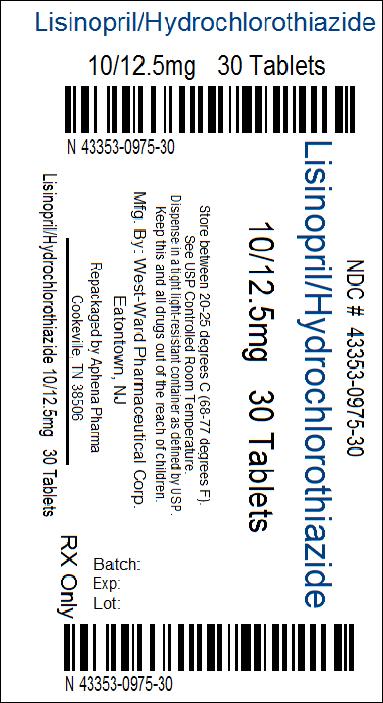Lisinopril With Hydrochlorothiazide | Aphena Pharma Solutions - Tennessee, Llc while Breastfeeding

What is Lisinopril With Hydrochlorothiazide | Aphena Pharma Solutions - Tennessee, Llc ?
Is using Lisinopril With Hydrochlorothiazide | Aphena Pharma Solutions - Tennessee, Llc safe or dangerous while breastfeeding?

Nursing Mothers It is not known whether lisinopril is excreted in human milk. However, milk of lactating rats contains radioactivity following administration of 14C lisinopril. In another study, lisinopril was present in rat milk at levels similar to plasma levels in the dams. Thiazides do appear in human milk. Because of the potential for serious adverse reactions in nursing infants from ACE inhibitors and hydrochlorothiazide, a decision should be made whether to discontinue nursing and/or discontinue Lisinopril and Hydrochlorothiazide Tablets, taking into account the importance of the drug to the mother.
Lisinopril With Hydrochlorothiazide | Aphena Pharma Solutions - Tennessee, Llc Breastfeeding Analsys
Hydrochlorothiazide while Breastfeeding
SafeCAS Number: 58-93-5
Thiazide diuretic drug. Excretion into breast milk is clinically non-significant. No side-effects were observed in a one-month old breastfed baby whose mother was treated with this medication. Drug level in the plasma of this child was undetectable. Long-term treatment with diuretic drugs (particularly Thiazide type ones with long-lasting effect and loop-acting mechanism) may inhibit lactation, mostly if lactation is not well-established yet. Use as lower dose as possible, especially during the first postnatal month. American Academy of Pediatrics 2013: Maternal Medication Usually Compatible With Breastfeeding. WHO Model List of Essential Drugs 2002: Compatible with breastfeeding.
Lisinopril while Breastfeeding
Low RiskCAS Number: 76547-98-3
Higher caution on early neonatal period is required. Check-up for blood hypotension and muscular hypotonia.
Lisinopril With Hydrochlorothiazide | Aphena Pharma Solutions - Tennessee, Llc Breastfeeding Analsys - 2
Hydrochlorothiazide while Breastfeeding
CAS Number: 58-93-5
Hydrochlorothiazide doses of 50 mg daily or less are acceptable during lactation. Intense diuresis with large doses may decrease breastmilk production.
Lisinopril while Breastfeeding
CAS Number: 83915-83-7
Because no information is available on the use of lisinopril during breastfeeding, an alternate drug may be preferred, especially while nursing a newborn or preterm infant.
I am nursing mother and I have already used Lisinopril With Hydrochlorothiazide | Aphena Pharma Solutions - Tennessee, Llc, what should I do?
Lisinopril With Hydrochlorothiazide | Aphena Pharma Solutions - Tennessee, Llc is in the category of low risk, if you have already used it then its not a big deal if health and behavior of baby is good. However your health care provider shall be aware of the fact that you have used Lisinopril With Hydrochlorothiazide | Aphena Pharma Solutions - Tennessee, Llc so you should inform him based on your convenience.
My doctor has prescribed me Lisinopril With Hydrochlorothiazide | Aphena Pharma Solutions - Tennessee, Llc, what should I do?
Though Lisinopril With Hydrochlorothiazide | Aphena Pharma Solutions - Tennessee, Llc dose not comes in category of safe drugs rather it comes in category of low risk but if your doctor is aware that you are breastfeeding your baby and has still recommended it then its advantages must be outweighing the risks.
If I am using Lisinopril With Hydrochlorothiazide | Aphena Pharma Solutions - Tennessee, Llc, will my baby need extra monitoring?
Not much monitoring required while using Lisinopril With Hydrochlorothiazide | Aphena Pharma Solutions - Tennessee, Llc
Who can I talk to if I have questions about usage of Lisinopril With Hydrochlorothiazide | Aphena Pharma Solutions - Tennessee, Llc in breastfeeding?
US
National Womens Health and Breastfeeding Helpline: 800-994-9662 (TDD 888-220-5446) 9 a.m. and 6 p.m. ET, Monday through Friday
UK
National Breastfeeding Helpline: 0300-100-0212 9.30am to 9.30pm, daily
Association of Breastfeeding Mothers: 0300-330-5453
La Leche League: 0345-120-2918
The Breastfeeding Network supporter line in Bengali and Sylheti: 0300-456-2421
National Childbirth Trust (NCT): 0300-330-0700
Australia
National Breastfeeding Helpline: 1800-686-268 24 hours a day, 7 days a week
Canada
Telehealth Ontario for breastfeeding: 1-866-797-0000 24 hours a day, 7 days a week
